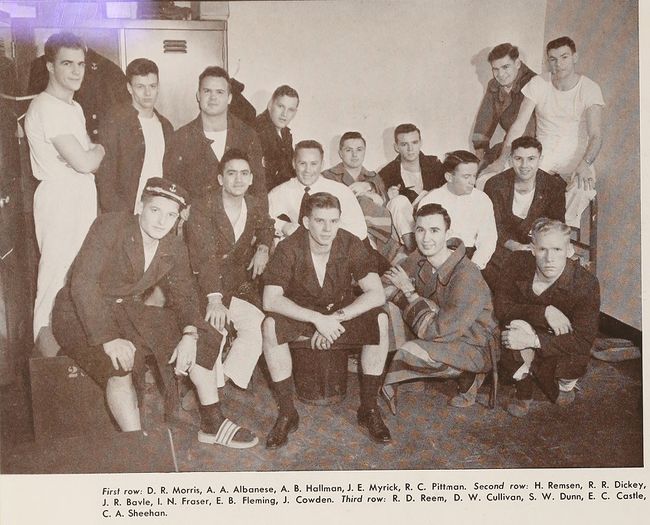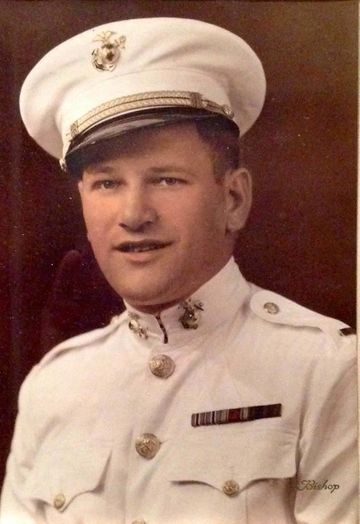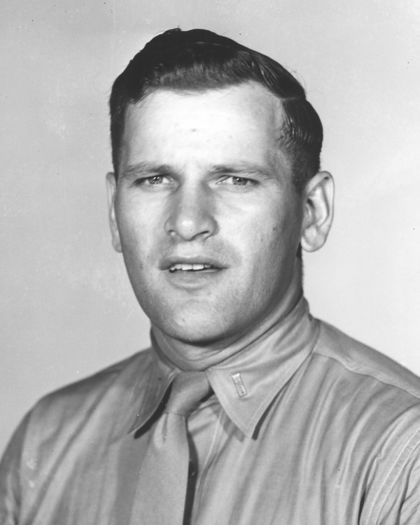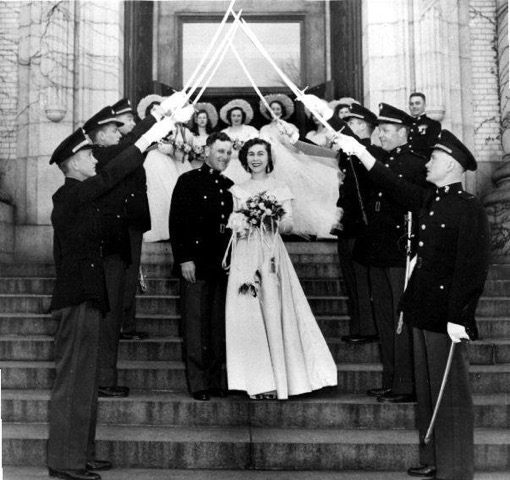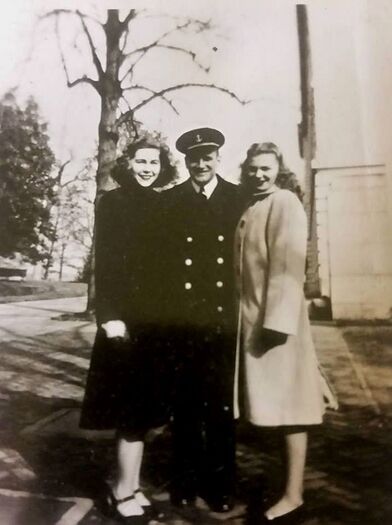ROBERT D. REEM, 2LT, USMC
Robert Reem '48
Lucky Bag
From the 1948 Lucky Bag:
ROBERT DALE REEM
Elizabethtown, Pennsylvania
Our friend Bullet arrived in Annapolis from NAPS . . . clad in the fetching ensemble of the Marine Corps . . . a uniform he is anxious to redon. For him, the sound of a bell was the signal to hit the sack . . . a delightful place where he would remain until the next bell started him to class. This system proved confusing during fire drills . . . Bullet got to most of the classes in good shape. After two years of treatment by sweating Dago profs, he still spoke French like a Mohican, out a week of his second summer leave spent in Bancroft Hall improved his linguistic abilities to the point where he spoke French like a six- month-old native. The Glee Club and Choir will both miss his warbling . . . Bullet's bass was famous in the first wing. A full treatment of his dragging activities is beyond the scope of the present text. Sailing and football kept him off the radiator squad, and a good part of second class year was spent recovering from the various injuries he received while a member of Colonel English's eleven. Even as an upperclassman he had one of the reg-gest lockers in Bancroft Hall.
Robert was a member of the choir and of the Glee Club. He graduated from the 3rd Company with the class of 1948-B in June 1948. (The top half of the class academically, designated 1948-A, graduated in June 1947 as the last wartime-accelerated class.)
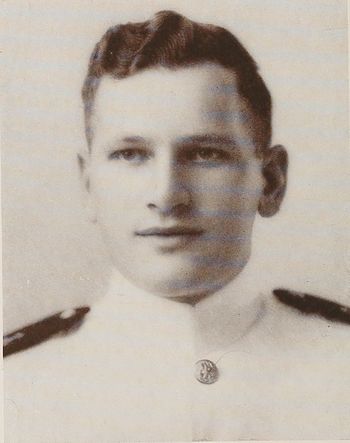
ROBERT DALE REEM
Elizabethtown, Pennsylvania
Our friend Bullet arrived in Annapolis from NAPS . . . clad in the fetching ensemble of the Marine Corps . . . a uniform he is anxious to redon. For him, the sound of a bell was the signal to hit the sack . . . a delightful place where he would remain until the next bell started him to class. This system proved confusing during fire drills . . . Bullet got to most of the classes in good shape. After two years of treatment by sweating Dago profs, he still spoke French like a Mohican, out a week of his second summer leave spent in Bancroft Hall improved his linguistic abilities to the point where he spoke French like a six- month-old native. The Glee Club and Choir will both miss his warbling . . . Bullet's bass was famous in the first wing. A full treatment of his dragging activities is beyond the scope of the present text. Sailing and football kept him off the radiator squad, and a good part of second class year was spent recovering from the various injuries he received while a member of Colonel English's eleven. Even as an upperclassman he had one of the reg-gest lockers in Bancroft Hall.
Robert was a member of the choir and of the Glee Club. He graduated from the 3rd Company with the class of 1948-B in June 1948. (The top half of the class academically, designated 1948-A, graduated in June 1947 as the last wartime-accelerated class.)
Loss
Robert was killed in action on November 6, 1950 when he threw himself on a grenade to save the lives of his men near Chinhung-ni, North Korea. He was posthumously awarded the Medal of Honor for his actions.
Biography
From Wikipedia's entry:
Robert Dale Reem was born on October 20, 1925 in Lancaster, Pennsylvania. He graduated from Elizabethtown High School in June 1943. During his final year of high school, he was a page in the Pennsylvania House of Representatives from January to May 1943. Robert Reem married Donna Z. Mayo
He enlisted in the United States Marine Corps in August 1943, completed his recruit training at Parris Island, South Carolina, in October and was selected for appointment to the Naval Academy at that time. He attended the Naval Academy Preparatory School at the Naval Training Center, Bainbridge, Maryland, before entering the Academy in June 1944.
He was commissioned a Marine Corps second lieutenant on June 4, 1948, upon his graduation from Annapolis. In June 1949, he completed the Basic School at Quantico, Virginia, where he remained with the Special Training Regiment until that August. In December 1949, after several months at Camp Lejeune, North Carolina, with the 3rd Battalion, 6th Marines, 2nd Marine Division, he was assigned with that battalion to duty with the Sixth Fleet in the Mediterranean.
In August 1950, the battalion was ordered to Korea, where it joined the 7th Marine Regiment, 1st Marine Division. 2Lt Reem fought with his battalion in the Inchon landing, the capture of Seoul, and the fighting in North Korea.
The 26-year-old Marine was commanding an infantry platoon near Chinhung-ni, North Korea, on November 6, 1950. He was preparing his men for an assault on an enemy position when the grenade landed among them. Without hesitation, he smothered the grenade’s explosion with his own body to save the rest of the group from death or serious injury. For this action, he was awarded the Medal of Honor.
The Medal of Honor was presented to his widow by Secretary of the Navy Dan A. Kimball in ceremonies on February 8, 1952 in Washington, D.C.
He initially was buried in the United Nations Cemetery near Hamhung, North Korea. His body was later returned to the United States for burial in Arlington National Cemetery, Arlington, Virginia. His grave can be found in section 6, Grave 9376-B, Map Grid X/18.
… Reem is memorialized at the US Naval Academy with a special dormitory room, the Reem room, with brass plaque.
Medal of Honor
From Hall of Valor:
The President of the United States of America, in the name of Congress, takes pride in presenting the Medal of Honor (Posthumously) to Second Lieutenant Robert Dale Reem (MCSN: 0-49636), United States Marine Corps, for conspicuous gallantry and intrepidity at the risk of his life above and beyond the call of duty on 6 November 1950, as a platoon commander in Company H, Third Battalion, Seventh Marines, FIRST Marine Division (Reinforced), in action against enemy aggressor forces in the vicinity of Chinhung-ni, Korea. Grimly determined to dislodge a group of heavy enemy infantry units occupying well-concealed and strongly fortified positions on commanding ground overlooking unprotected terrain, Second Lieutenant Reem moved slowly forward up the side of the ridge with his platoon in the face of a veritable hail of shattering hostile machinegun, grenade, and rifle fire. Three times repulsed by a resolute enemy force in achieving his objective, and pinned down by the continuing fury of hostile fire, he rallied and regrouped the heroic men in his depleted and disorganized platoon in preparation for a fourth attack. Issuing last-minute orders to his noncommissioned officers when an enemy grenade landed in a depression of the rocky ground in which the group was standing, Second Lieutenant Reem unhesitatingly chose to sacrifice himself and, springing upon the deadly missile, absorbed the full impact of the explosion in his body, thus protecting others from serious injury and possible death. Stouthearted and indomitable, he readily yielded his own chance of survival that his subordinate leaders might live to carry on the fight against a fanatic enemy. His superb courage, cool decisiveness, and valiant spirit of self-sacrifice in the face of certain death reflect the highest credit upon Second Lieutenant Reem and the United States Naval Service. He gallantly gave his life for his country.
Action Date: 6-Nov-50
Service: Marine Corps
Rank: Second Lieutenant
Company: Company H
Battalion: 3d Battalion
Regiment: 7th Marines
Division: 1st Marine Division (Rein.)
Remembrances
From a blog post:
Lt. Reem’s company commander, 1st Lt. Howard H. Harris, sent a letter to Reem’s grandfather explaining what had happened on November 6, 1950. Reem was “suffering from a very severe cold . . . but refused to go the Battalion Aid Station for fear he might be evacuated,” Harris revealed. After launching an attack straight up what Harris described as "a mountain,” the Marines were stopped about fifty feet from the summit when “a large 'potato smasher’ type grenade" landed amongst them.
“I’m sure that his suffering was very brief,” Harris told the grandfather after describing what had happened. “Bob’s boys,” he continued, “were dazed for many days after his death, but in tribute to his brave action they carried on with the same fighting spirit. We retook the position . . .” (Tragically, by the end of December, many of Lt. Reem’s men would be dead. They would be killed at Chosin Reservoir, one of the most brutal and costly battles of the Korean War).
Harris concluded his letter saying, “Hoping that this information can be of some value to you and that you will accept my deepest sympathies for the loss of your beloved grandson. He was a fine Marine, a credit to his country, and the fine Corps that we all love so well.”
On February 8, 1952, Donna received Lt. Reem's Medal of Honor at a ceremony in Washington, DC. It was a bittersweet moment. She was grateful for her husband’s recognition but said later in a magazine article, “I don’t care about the Medal of Honor. I just want Bob back.”
Eleanor Coble, Reem’s younger sister remarked years later about her brother, “He always wanted to join the Marines. He talked about it all the time.” Echoing her words, Donna said in a 1953 magazine article, “He promised me he wouldn’t do anything heroic, and he wouldn’t have done it for himself. But he always thought of his men.” Donna Reem eventually remarried, had children, and died at the age of 90.
Photographs
Other Information
Donna eventually remarried, had children, and died at the age of 90.
The book "Don't Do Anything Heroic": Six Months To Inchon..." was published on March 26, 2024.
This book is a collection of letters sent daily, by 2nd Lieutenant Robert Dale Reem, USMC to his new bride at home, Donna. Bob was deployed in April 1950 from Norfolk, Virginia aboard the USS Worcester CL144. He was one of the FMF (Fleet Marine Force) Officers aboard with 97 Marines of, H Co. 3rd Bat. 6th Marines. It was foreseen that the annual Sixth Fleet Mediterranean Cruse of 1950, would be a typically exciting five month cruse for Bob and his FMF Marines, incorporating daily training, educational lectures and of course, enjoying Ports of Call all across the Mediterranean Sea. Little did anyone know that in July 1950, North Korea would invade South Korea, beginning the Korean War.
This collection of daily letters, to his Darling Donna, unknowingly would be his last words written to her, as he would never see her again. In August 1950, Bob transferred several times to ships redirected through the Suez Canal and onto Kobe, Japan, awaiting orders for the invasion at Inchon by General MacArthur in September. After the capture of Seoul, Bob’s Company was routed by transport ship around the southern tip of South Korea to the western port of Wosan, in North Korea.
Related Articles
Ian Fraser '48 was also in 3rd Company.

The "category" links below lead to lists of related Honorees; use them to explore further the service and sacrifice of alumni in Memorial Hall.
